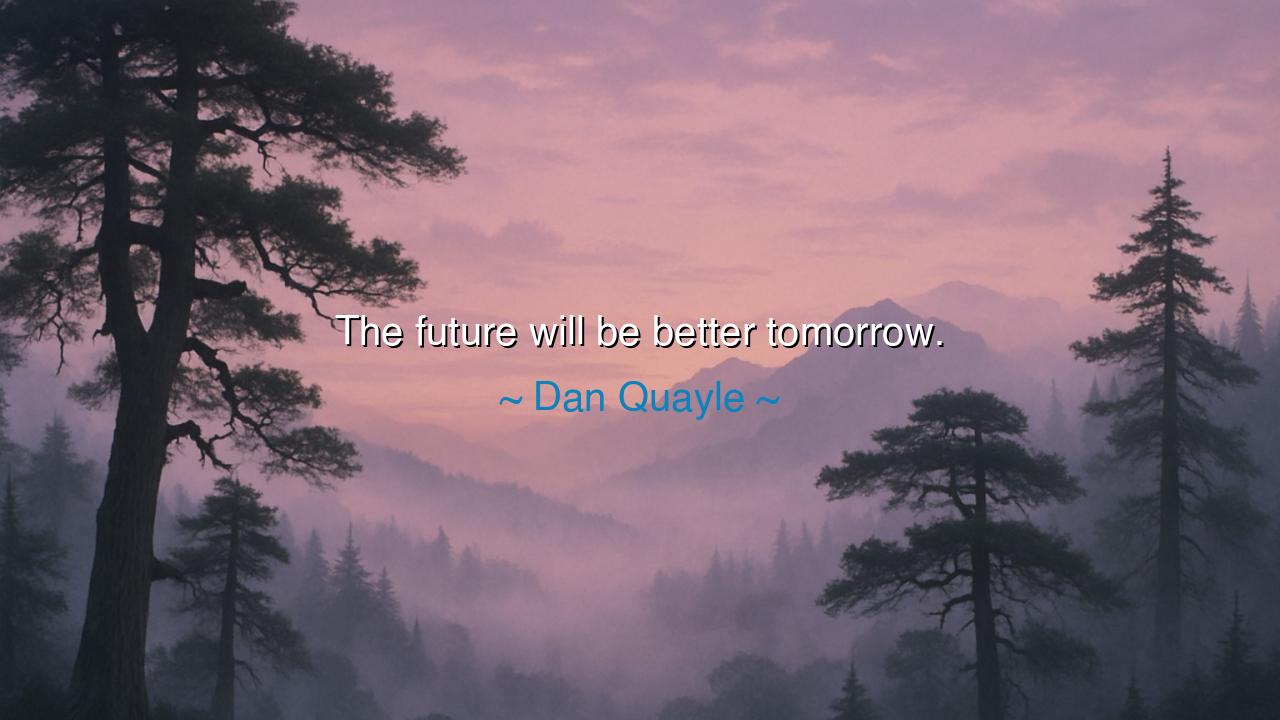
The future will be better tomorrow.






“The future will be better tomorrow.”
— Dan Quayle
In these brief and curious words, Dan Quayle, former Vice President of the United States, utters a phrase that has often been remembered for its simplicity and awkward phrasing. Yet within this simplicity lies a kind of unintentional wisdom, a truth that hums beneath the laughter of time. Though perhaps spoken in haste, his words carry the eternal hope of humankind—the belief that no matter how uncertain today may seem, tomorrow holds the promise of renewal. The sentence, imperfect in structure, is perfect in spirit. It captures, in its childlike form, the ancient conviction that the future can and will improve, if we hold faith, work with purpose, and endure the passing storms of the present.
The origin of this quote lies in a moment of public speech, one of those unscripted flashes that history preserves not for elegance, but for honesty. In 1992, Dan Quayle, addressing the nation, intended to speak of hope and progress. What emerged instead was this wonderfully redundant phrase: “The future will be better tomorrow.” To some, it was a verbal stumble; to others, it became a symbol of naïve optimism. But beyond its humor, one finds an echo of the ancient truth that the future is always built from the hope we hold today. Even an imperfect expression can contain profound meaning—for what are we all, if not imperfect vessels carrying divine intention?
There is beauty in the innocence of the statement, for it does not argue or explain—it simply believes. The ancients often taught that wisdom is not only found in the philosopher’s polished words, but also in the unguarded speech of those who speak from faith rather than knowledge. “The future will be better tomorrow” is such a saying—unrefined, yet radiant with human longing. It reminds us that no matter how troubled the present may seem, tomorrow is a canvas not yet painted. To look toward it with expectation, even clumsy expectation, is the very essence of hope.
History, too, bears witness to this truth. Consider the story of Abraham Lincoln, who led a nation divided by war and hatred. In his time, the future looked bleak; the horizon was filled with smoke and sorrow. Yet Lincoln, with steadfast faith, spoke not of despair, but of renewal. Even in the darkest hours of the Civil War, he declared his belief in “a new birth of freedom.” Like Quayle’s accidental prophecy, Lincoln’s faith was in tomorrow—a tomorrow that could not yet be seen, but one that would come if humanity chose to build it. And indeed, it did come, born out of struggle, sacrifice, and the stubborn belief that the future can be better than the past.
What Quayle’s words lack in eloquence, they make up for in universality. For who among us has not stumbled in our speech while reaching for hope? Who has not, in moments of uncertainty, uttered some awkward phrase to comfort ourselves or others? Yet such simplicity carries truth: the belief that tomorrow holds healing, that life continues to move forward, that despair is never final. The statement’s grammatical imperfection mirrors our own flawed yet unbreakable humanity. We are all, in a sense, like Quayle—hoping, fumbling, believing, and speaking faith into the unknown.
The wisdom of this quote, then, is not about language—it is about perspective. It reminds us that we must keep our eyes fixed on the horizon, even when the path ahead is unclear. The future will indeed be better tomorrow—not because time itself changes things, but because we change within it. Every sunrise offers a chance to act with greater compassion, to learn from yesterday’s mistakes, to work toward something higher. The better future is not delivered by fate; it is built by hearts that refuse to give up.
So, my listener, take these words—humble though they are—as a light to carry through your days. When you face hardship, remember that tomorrow is the womb of possibility. No darkness lasts forever, and no failure defines you unless you surrender to it. Speak, even awkwardly, of your hopes; declare, even imperfectly, your faith in what is yet to come. For perfection is not required to inspire change—only belief is. And as Dan Quayle once unknowingly reminded us, the future will be better tomorrow, because hope, renewed daily, has always been the first step toward every great dawn.






AAdministratorAdministrator
Welcome, honored guests. Please leave a comment, we will respond soon